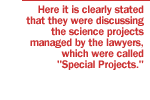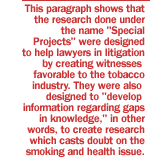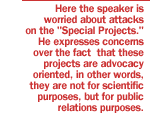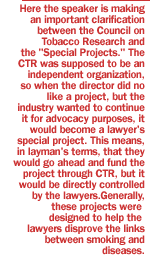
 |
 |
 |
 |

 |  |

|

September 18, 1981
VIA FEDERAL EXPRESS
Joseph H. Greer, Esq.
Vice President and General Counsel
Liggett & Myers Tobacco Company, Inc.
West Main and Fuller Streets
Durham, North Carolina 27702
Dear Joe:
I am enclosing a copy of my notes taken at the meeting of the Committee of
General Counsel which was held on September 10, 1981 at Charbourne, Parke.
You will see that the meeting covered five subjects as follows: (1) Special
Projects, (2) Status of Cases, (3) NCI workshops on the side-stream smoke, (4)
Literature Retrieval Division, and (5) the 20 Asbestos witnesses. I decided to
send you a transcription of my notes because that seemed to be the most
effective way to give you an accurate sense of how the meeting went. I hope
the transcript accomplishes this purpose.
 |  |

|

1. Special Projects--
Jacob Crohn called, said he had received a communication from Arthur
Stevens who wanted a thorough-going understanding of what was happening and
that there ought to be a meeting on the subject. Jacob then defined the
special projects and their origin in litigating lawyer needs.
Purposes: 1-develop witness-stimulate the interest of doctors.
2-develop information re gaps in the knowledge.
 |  |

|

Stevens It is timely to re-examine the special projects. Want to make
it invulnerable to attack. He is concerned with degree to which we make
advocacy primary and science becomes secondary. He knows it is difficult to
find witnesses. He is concerned over the fact that some names appear on the
list time and again; such as Sterling, Furst, Aviado, who will start to lose
credibility for themselves and for us. He is concerned about the quality of
the science to cultivate witnesses.
 |  |

|

Jacob If you have a doctor, you have to keep him busy or he will
lose interest. Sterling has been enormously helpful. Berkson receives a small
check and he has been helpful.
Witt Maybe the approach ought to be advocacy first and science
second.
 |  |

|

Stevens Two other factors that concern me:
1. I need to know what the historical reasons were for the difference
between the criteria for lawyers' special projects and CTR special projects.
2. I understand that there will be times when we need to get money
into the hands of a researcher like Janus, but I would rather not create a
project that does not make any sense ("pseudo science").
Jacob When we started the CTR Special Projects, the idea was that the
scientific director of CTR would review a project. If he liked it, it was a
CTR Special Project. If he did not like it, then it became a lawyer's special
project.
Stevens He took offense re scientific embarrassment to us, but not to
CTR.
 |  |

|

Jacob With Spielberger, we were afraid of discovery for FTC and with
Aviado, we wanted to protect it under the lawyers. We did not want it out in
the open.

home .
discussion .
quiz .
the criminal probe .
will there be a deal? .
a look at the depositions .
big tobacco - what's at stake .
interviews
timelines .
faqs .
links & readings .
synopsis .
tapes & transcripts .
press reaction
frontline online .
wgbh .
pbs online
web site copyright WGBH educational foundation
|  |
|